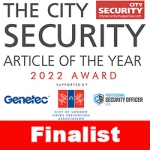Professional standards in security
 We have all heard comments such as “He/ She is very professional” or someone describing another’s actions as “so unprofessional”. But what does it mean? How do we assess that?
We have all heard comments such as “He/ She is very professional” or someone describing another’s actions as “so unprofessional”. But what does it mean? How do we assess that?
My opinion is that standards of professionalism and appropriate behaviour filters are largely built into a person. You start learning them from a young age and they have lots to do with your learnt and taught behaviour as a child, youth and adult.
Professional Standards is the term often used to describe an organisation’s rules of behaviour or ethics. I worked at various levels within Professional Standards departments for about a third of my policing career and I have seen behaviour that would definitely be described as unprofessional when held against a backdrop of policing London (or any city for that matter).
It is my experience that frontline operatives of any profession are expected to have higher standards of professionalism than other members of the general public. Frontline shop staff, rail and road workers, police, healthcare professionals and security teams are all subject to greater scrutiny. This has only been exacerbated in the past year due to the COVID-19 pandemic, and will continue as lockdown measures ease. Frontline operatives are regularly exposed to incidents involving conflict whereby they are verbally and sometimes physically abused – their action, inaction, or indeed, reaction being filmed in order to sensationalise across social media. Everyone will take a view. Many will take to commenting, few will support. How do we help ourselves?
My only advice during the COVID-19 pandemic and into the future is: “Maintain your professionalism and implement your training”.
There is that word again. Professionalism. So let’s examine what it means for the security professional.
I think there are three basic stages:
- Training
- Service delivery
- CPD Training
It all starts with the right training. A lot of frontline security is licensed by the SIA and you need to choose a training provider to teach you how to deal with the experiences you will encounter. You need to choose one that is professional.
There are some training providers that have seen an opportunity to make money. They have identified opportunities in the awarding body’s processes that allow them to exploit people for money. They are often significantly cheaper than others; you may even arrive and never get taught anything. They will “complete” the course for you and send you away on the first day declaring they will fill out the paperwork and sort everything out. You think you have had a result; after all, you are busy and they are doing you a favour.
Everyone is happy. They advise you to apply for your licence some weeks later after you receive a certificate for a course you have never actually completed.
You get a licence, they get their money and no one is any the wiser.
You are “trained” and you hold a licence.
But you don’t actually know what to do, professionally, in situations of real conflict. You can revert to basic human instinct, you can react as an ordinary member of the public, but you can’t revert to your training, as you haven’t had any. Despite what your licence says.
You know it’s not right, you must know this, but you don’t care because it was cheap and you have been earning money as you have a licence.
It’s not professional, the company is not professional. We don’t need the awarding body list of professional standards to tell us this. It’s obvious …. .isn’t it?
True professionals in security would choose a respectable and professional training provider. If confronted with the above situation they would walk away and seek someone else. However hard a course is , there is personal satisfaction and pride in completing and passing. Maybe that’s the difference? Pride?
Service Delivery
We have seen that our unprofessional operator doesn’t care about their training, so they’re unlikely to care about the client or the quality of the service delivered. They just want to earn money. They might be late sometimes, leave early, not follow company process, be a bit aggressive, leave things lying around, not lock gates, fall asleep during shift, take photos of client property, upload private information onto social media in order to promote themselves. They might be a bit scruffy, gossip about everyone and go all out to try and make others around them look bad. We have all met them. None of us want to work with them.
But do we challenge it? Is this sort of behaviour inbuilt? Surely no training course in the world could have righted those traits? Probably not, but a good training provider might have failed them.
Our professional operator is smart and on time, they do some personal research on the area and determine what may be a risk to them, they are subtle and discrete and they know not to post photos or comment on social media that could embarrass them. Perhaps they learnt some of that research and service delivery tips on their training course, the rest will be inbuilt standards. The company professional standards policy /lists of behaviours come as no surprise to this operator because they have high standards of professionalism.
CPD
Our unprofessional operator doesn’t know what this is; they have their licence, that means they can work and earn money. What’s the point? New laws, learning lessons from tragedies, new skills, modern thinking, keeping the public safer. Who cares? Not this call sign. It’s all about the money.
Our professional operator is keeping abreast of the news, they are watching, with interest, the development of new legislation and training that will help them to deliver a better service, they are on webinars mixing with other professional operators learning good practice and sharing best practice. They are signing up for career development courses and webinars. They care. They have pride. Some may want to sign up to one of the security membership organisations where they can demonstrate and evidence how professional they are. Others may gather a following on business platforms and encourage healthy debate using respectful and inclusive language, their best practice opinions may resonate with others and they may change and shape the thinking of others.
Most professional operators don’t fear the professional standards of the company they work for because their standards of professionalism already moderate their behaviours. Nothing in the list causes them to have to change their behaviours, because the list is obvious, right?
We all strive to be just like the professional operator. We all want to work with people and companies just like that. If you are like that, come and work with me at the Security Institute
Angie Clarke CSyP FSyI
Director
The Security Institute
Click here for more articles on developing your Security Career.
Click here for more articles from the Security Institute
Click here from more articles on Security Training


